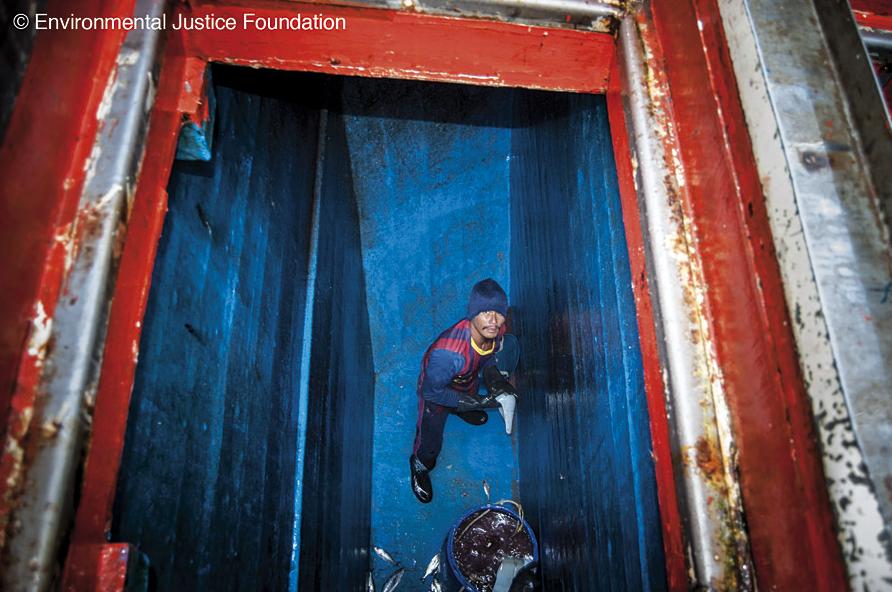New evidence of migrant slavery has emerged along the coast of Thailand, the world’s third largest exporter of seafood.
Environmental Justice Foundation (EJF), a UK based non-governmental organisation that advocates for humane and environmentally responsible development, said that the sale of human labourers from Burma and other Southeast Asian countries continues unchecked to Thai fisheries, which supply supermarkets and restaurants the world over.
“Migrant workers in the Thai fishing industry, many of them trafficked illegally, are suffering terrible abuses and all too often are denied their basic human rights,” said EJF executive director Steve Trent. The organisation holds that the severity of corruption, poor labour conditions and deficient migration policies warrant sanctioning the industry.
New EJF research, published on Tuesday in a report entitled, “Slavery at Sea”, reveals fresh instances of trafficking and forced labour. The report further suggests that Thai authorities are complicit, by both abetting people smugglers and accepting bribes from slave-keeping business owners.
“The guys who brought us here were experts… We starved on the way but then they took us by police car and we were transferred to the pier. There we were sold,” reads the testimony of a 21 year old Burmese migrant who set off by foot with 36 others — led by an employment broker named Ko Nge — from Myawaddy. Some were lost or killed before reaching Thailand’s watery margins.
Migrants are duped by employment brokers, the report says, who sell them to boat owners in Trang Province and several places near Bangkok in the upper corners of the Gulf of Thailand, where they are forced to work — sometimes for years — with no pay. Victims often suffer threats, beatings and starvation.
Thai seafood exports reel in billions of dollars each year, with 90 percent of the products being sent to the US, EU and Japan. Reliance on the industry, said EJF, has had a domino effect on labour. Overfishing diminishes supply and leads to lower yields, which necessitates longer stints at sea. Price of labour for the taxing and dangerous work — toxically mixed with poor regulation and corrupt officials — incentivises trafficking with little or no consequence.
Arrests and investigations do occur but remain rare, despite Thailand’s 2007 anti-human trafficking legislation and the 2011 establishment of the Royal Thai Police Anti-Human Trafficking Division (AHTD). In August 2013, a notorious trafficking ringleader, Ko Myo, was apprehended by the AHTD along with three of his accomplices. While the arrests showed a degree of sincerity, Trent believes that actions to date don’t match the scale of the problem, which extends to individuals within the police force itself.
“EJF believes that human trafficking in Thailand will only be resolved if the business owners and corrupt officials profiting from trafficked labour are held to account for their activities,” he said. “To our knowledge, no investigation has been carried out into alleged police involvement in the trafficking of migrants for the fishing industry in Kantang, and the ex-immigration official who allegedly provided support and shelter to Ko Myo.”
Thailand has long had a bad record in terms of trafficking, but years of impunity seem soon to expire. The US State Department produces an annual Trafficking in Persons (TIP) Report, which places countries on one of three performance ‘tiers’, the lowest of which comes with penalties in the form of sanctions.
Performance is measured against standards laid out in the Victims of Trafficking and Violence Protection Act, passed by US Congress in 2000. Four years ago, Thailand dropped from tier two — non-compliance with effort to improve — to the “Tier Two Watchlist”, where it has idled since. The watchlist ranking means that severe forms of trafficking persist or are increasing with inadequate resolve.
This year, in accordance with State Department policy, Thailand’s ranking must either go up or down. “Based on evidence gathered by EJF in the last two years, as well as that of others monitoring the industry, EJF believes a downgrade to Tier 3 is the only suitable course of action,” reads the EJF report.
[related]
Thai shrimp is already restricted in the US, and a demotion in TIP status would require further constraints including the withdrawal of non-humanitarian and non-trade-related foreign assistance to Thailand, as well as embargoes on specified products.
But sanctions are not exactly the desired outcome for anyone. Walter Braunohler, spokesman for the US Embassy in Bangkok, told DVB that the US is serious about working with Thailand to reduce trafficking by encouraging institutional action targeting the problem’s core.
“We encourage Thailand to conduct thorough investigations of reports of trafficking and to prosecute all trafficking offenders and apply stringent penalties in accordance with international standards,” he said.
“We also continue to advocate for strengthened victim identification and protection procedures.”
In light of these new facts about Thailand’s seafood, Trent said that the burden is not just on Thailand. Foreign consumers, he contended, can do more to ensure sea-to-table traceability. “Our Governments and the international seafood industry simply cannot continue to ignore this,” he said, “they must demand immediate reform and action to stop these abuses or refuse Thai seafood that is produced by slaves.”
Nearly 10 percent of Thailand’s workforce is made of migrant labour from Burma, Laos and Cambodia. Ninety percent of migrant labour is employed, sometimes forcibly, in the seafood industry.
Twenty-nine rescue operations led in part by the Myanmar [Burma] Association of Thailand, some in collusion with the AHTD, have resulted in the liberation of 201 victims of trafficking in the fishing industry since the start of 2013. Many more are thought to be held on boats just a few miles from Thailand’s famously elegant shores, allowed to float for months on end beyond the reach of law.
Read the full report by Environmental Justice Foundation here.
This post was edited on 5 March to protect the identity of a trafficking victim.



